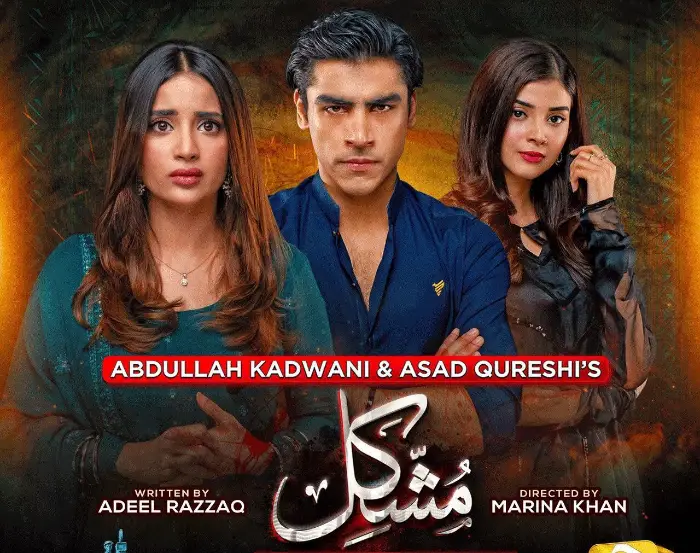“Mushkil” has been an enjoyable ride for the past couple of months, the premise keeping viewers engaged with its story of the obsessive stalker, Hareem (Zainab Shabbir) and the predicament her obsession puts her best friend, Sameen (Saboor Aly), in. While it’s Hareem’s actions which cause Sameen and Faraz (Khushhal Khan) to ultimately find themselves married, Hareem sets out to exact her revenge upon Sameen. Starring Khusshal Khan, Saboor Aly, Zainab Shabbir, Behroze Sabzwari, Hamayoun Ashraf, Shagufta Ejaz, Qudsia Ali, Laila Wasti, Saife Hassan and others in prominent roles, the story has been written by Adeel Razzaq and directed by Marina Khan.
In the finale, Hareem prepares happily for her marriage to Faraz while his mother (Shagufta Ejaz) attempts to put a stop to the wedding by bringing Sameen back home. Fortunately, the wedding is stopped well beforehand when Arif confesses that Hareem was behind Asfand’s (Hamayoun Ashraf) murder. Hareem is arrested, left to her delusions, while Faraz pacifies an angry Sameen and the families rejoice as Faraz and Sameen bring a little boy into the world.
As a reviewer and active drama viewer, it’s important to point out both strengths and weaknesses. And while one an absolutely heap lavish praises upon “Mushkil” for its strengths, it also has an incredible number of weaknesses. Speaking of positives first, the strengths of “Mushkil” have been the entertaining exchanges between Sameen and Hareem, their characters both showing confidence in themselves and a means to achieve their own goals. Of course, the greatest positive has been the chemistry between Khushhal Khan and Saboor Aly as Faraz and Sameen. Someone please sign Khushhal Khan and Saboor Aly for another quality show together immediately. The other strength of the show has been Zainab Shabbir’s performance as Hareem, a character who the audience has loved to hate. This role would not have been the same without Zainab’s performance.
Now let’s come to negatives. To call “Mushkil” illogical would be an understatement. This show started off very well with both Faraz and Sameen seeing Hareem for who she is…..however, from the get-go, logic would have stated to inform the entire family of Hareem’s plot before she married Asfand. However, Sameen and Faraz remained silent throughout, all while Hareem created havoc in the house, turning the family against them. Where is the logic? Hareem made several advances openly on Faraz both before and after Asfand’s death…..and yet, Faraz wound up manipulated into believing the accusations against Sameen and agreed to marry Hareem? Please, make this story arc make sense. It never did make sense nor did viewers find it believable, leaving most holding their heads in disbelief or hoping it was Faraz’s plan.
What is actually quite refreshing about the ending is that Hareem never “goes crazy” as we see often in other dramas. Hareem has always been unstable and she continues in her instability, plotting from her hospital bed and jail, creating ways in her head to “win back Faraz.” While the “villain going mad” cliché is old and moldy, it feels quite apt this time around, because the villain has always been mentally unwell. Overall, the success of “Mushkil” can be attributed to Saboor Aly and Khushhal Khan’s chemistry and performances, along with Zainab Shabbir’s performance. The rest…….”illogical” does sum it up.
